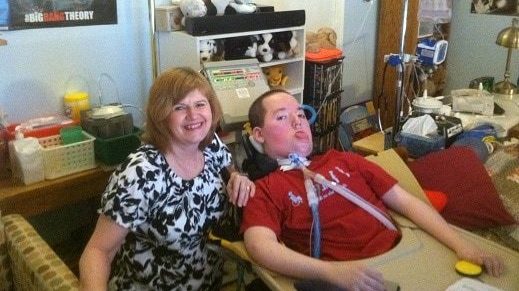I first heard about Joseph Walter from someone whose job is trumpeting schools’ accomplishments, so I’m a little skeptical that he’ll, quote, “change me.” But I go to meet him and his best translator — his mother, Debra — at their house in Clay, Alabama. I knock on the door and introduce myself as she leads me into the house to Joseph’s room. His enthusiastic greeting overpowers the rushing sounds and constant whine of his ventilator.
Joseph can move only one thumb and two fingers, one on each hand. He’s in a special $5,000 chair in the main room, the walls of which are covered with colorful movie posters and other art he likes. He’s hooked up to the ventilator, and to something else important — the computer that connects him to the outside world. It’s got a little joystick that moves a cursor over letters. Joseph types them by using his other hand to click a button. But he didn’t have that back in his early school days.
“Most of his tests were multiple choice,” says Pam Smith, a Jefferson County educator who was Joseph’s three-hour-a-week homebound teacher starting when he was in first grade. “He’d read the question, and then he would sing.” If Joseph hummed the first four letters of the the alphabet, she would ask, “Is your answer D?” And then, she says, “I could tell by his eyes.”
Joseph has never been in a standard classroom.
Speaking through his mother, Joseph says, “People don’t really understand how good a classroom is, because at least if you’re in a classroom, they explain things to you.”
Math gave him the most trouble. Debra says, “You and I take out a scratch piece of paper and work our problems out. He can’t do that — he does it in his head.”
This story can’t cover all Joseph’s challenges, but it can’t cover all his accomplishments, either. Joseph’s doctors told his parents he wouldn’t live past two, but he just graduated high school ranked twentieth out of almost 300. His language arts ACT scores are well into the nation’s top ten percent. And crucially for Joseph and his family — who have insurance but struggle with out-of-pocket costs — he’s earned a full scholarship to Kaplan University worth $67,000.
Debra recalls, “The lady on the phone said, ‘You’ve got a scholarship to Kaplan,’ and then …. He couldn’t talk. He just closed his eyes and had tears running down his face.”
Part of what got him the scholarship is his writing, which Pam Smith calls “off the charts.” Joseph is a real writer, and it’s one way his wicked sense of humor gets to come out and play. A family favorite is an essay that makes the case for cooking children. It’s actually a satire of wealth inequality and stereotypes, but just in case I didn’t get that, Joseph promises me he doesn’t share any tendencies with a famously hungry villain once played by Anthony Hopkins.
Debra explains that Joseph has to watch gruesome films like that, not to mention the CSI-type shows that he loves, because they’re related to his career: He wants to be a forensic psychologist specializing in facial micromovement detection. In other words, he wants to look at video of people’s faces and help law enforcement determine whether they’re lying. He’s completed a nearby police department’s Citizens Academy course, and he’s writing a detective novel.
Joseph has been defying expectations for years. He’s had support — his parents, teachers, tutors, nurses — but he seems to help those who know him at least as much as they help him. Normally jaded reporters included. Before I leave, I ask a standard question: “Is there anything else you think our listeners and readers should know — anything I might have forgotten to ask you?”
Joseph answers through his mother again:
“He just wants to make sure people know … that you always keep fighting. No matter what.”
It’s easier to take advice from people who back it up themselves.
Perspective adjusted.

